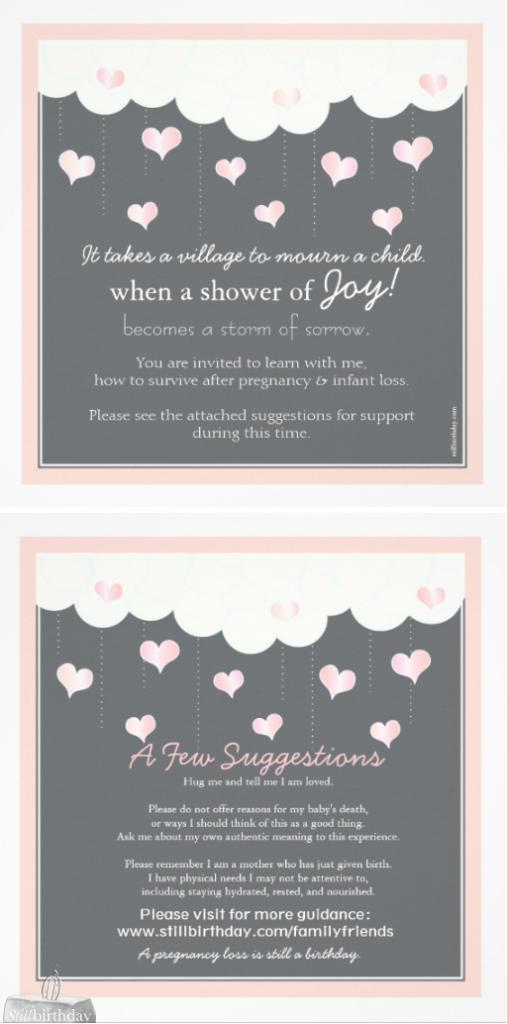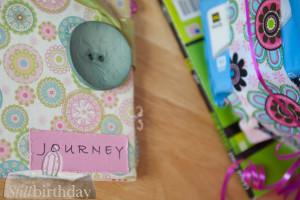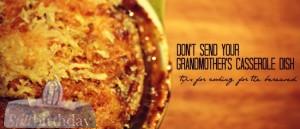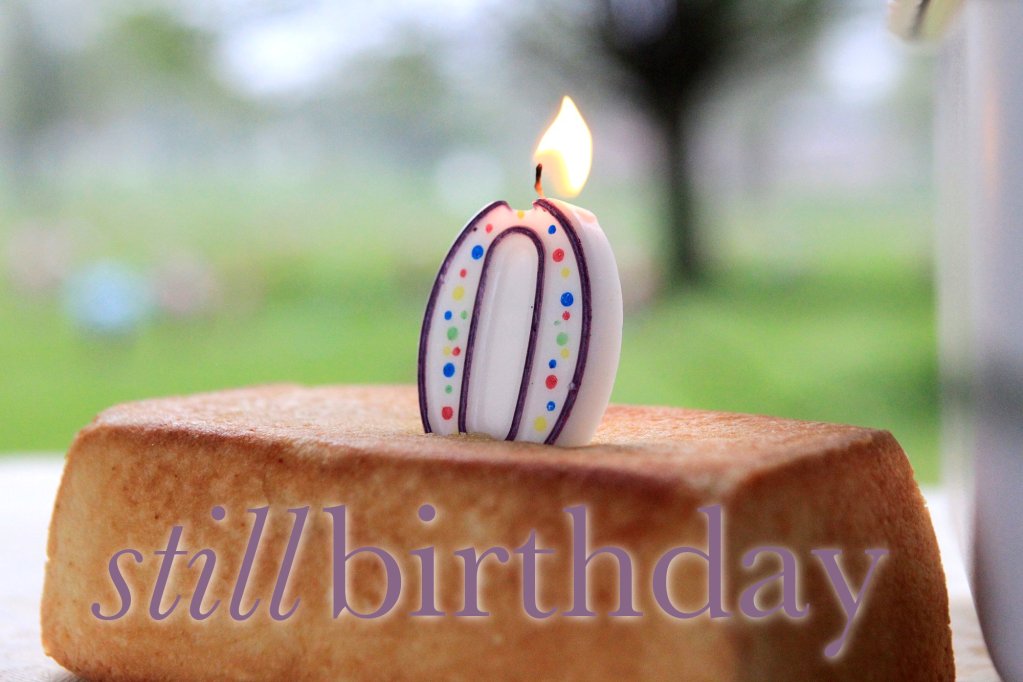It can be terribly uncomfortable, wanting to offer support to parents of a baby not alive, but not knowing the best way to do it. Sometimes very well meaning and loving expressions can actually be received as insulting and damaging. To prevent this, here is a helpful list of ideas for you to consider:
Moms, if you’d like, you can print this PDF:
A Gentle Announcement of Birth & Bereavement
which will give you two pictures that you can cut around the edges, fold as a card,
and simply write the recipient’s name on or a brief “please read this” on the plain white portion.
Then they will open your card into the grey and pink.
As a Loved One, Helpful Things You Might Know:
- You can be a much needed support prior to, during (yes, that’s right, during), or after birth in any trimester.
- Research proves that the level of grief a parent experiences is not conditional upon the age of the child. Meaning, younger children are “worth” just as much grief as older children.
- Mothers who experience pregnancy & infant loss are at risk of developing postpartum major depression. The risk of this depression is highest within the first six months after birth. The mothers who are at greatest risk of becoming depressed are those who fail to show any signs of grief during the first two weeks after the birth (source). Experiencing pregnancy & infant loss in a way that demonstrates the reality of your baby’s life, and death, is actually important to your postpartum health.
- Men and women experience grief differently. Supportive efforts might be helpful for one parent more than the other. We have support for dads here, too.
- Grief can be ongoing, can seem unpredictable, and can take time. Parents remember their children for the rest of their lives.
- You and your bereaved loved one may benefit greatly from you learning about their type of loss and the other information we share here at stillbirthday, including support for getting pregnant again, support for surviving siblings, facing a struggle with fertility, and more.
- The parents at highest risk of complications in their emotional healing are those that show no signs of grief in the first two weeks following the death of their child.
- The actual loss is only the beginning of a journey of grief. The four most difficult times following a pregnancy loss are often: the return of the first menstrual cycle, the month in which the gender of the baby would have been discovered, the due date for the full term delivery, and the timeframe of the first anniversary of the loss (first stillbirthday). Holidays within the first year can also be painful, particularly Mother’s Day/Father’s Day (and/or Bereaved Mothers/Bereaved Fathers days), Thanksgiving and Christmas. Mothers too can face climactic milestones in subsequent pregnancy and birth. It is extremely positive to remember these times and reach out to your loved ones during at least one of these, offering to share an afternoon together or just to let them know that you care.
- Grief can include a full range of feelings, at any time, including happiness and relief. Grief isn’t bound by blue or grey but can be every color of the rainbow.
- You may be grieving, too, and may benefit from utilizing long term support services
- If the couple has other children, there is information and support for older siblings.
- Honoring the privacy of the parents is important, but so is being able to communicate your own grief. For that reason, we have a section here where you can share your story (and read other stories), and it will be published in the category of “friends & family”. Your story can bless others in a similar situation, without overstepping the privacy that the parents may have requested. We ask that you do not use their real names in your story.
- Grandparents grieve too.
- Stillbirthday has helpful resources for grandparents, fathers, surviving and subsequent children:Emotional/Spiritual Support.
- Crisis Lines, Books, Websites (some by country) can be helpful for you to know for the parents.
Helpful Things You Might Bring:
Bring A Love Basket, for the earliest and darkest days.
These are suggested items, and may be brought by more than one loved one:
- buy a special gown (particularly from Bg&Co) for the mother to give birth in
- gather information for the mother on prior to birth, during birth, and after birth
- understand about postpartum items and support she may need, including maxi pads for lochia, and items to support her decision regarding breastmilk (including donation). It can be totally appropriate to offer her both, milk boosting and milk cessation tea, if she has given birth at approximately 20 gestation weeks or further into the pregnancy. This way she can choose, and choose again.
- buy a small or medium sized package of heavy maxi pads for the mom, or cloth pads(birth in any trimester can mean a lot of bleeding)
- lavender essential oil drops and witch hazel for postpartum perineum care
- bring a meal (or two) that is easy to prepare (more information on this below)
- bring healthful, easy to munch snacks that can aid in healthy grieving
- our postpartum wellness page has some ideas you can draw from
- scroll through our Farewell Celebration sub-menu that appears when you hover your mouse over the link. You’ll see things like our keepsake pages that might give you ideas on gifts, as well as including the baby’s name. Learn what the baby’s name means.
- buy a teddy bear or other gift, particularly prior to or during the birth, so that the mother won’t have to leave the place of her child’s birth empty-handed – see our craft idea with teddy bears below
- give the mother a gift card (not a huge amount, $20 would be great) to her favorite shop or a clothing store
- buy the mom a comfortably-fitting blouse that is non-maternity (especially if she was further along in pregnancy)
- buy the mom a gorgeous journal – and can even include an envelope in it that contains brief little journal entries of your own thoughts. This can be very valuable if you’ve been physically separated from the mother since the birth and death of the baby.
- include a card that shares your raw feelings and includes the baby’s name, as well as lists any other tangible ways you are available to help, including babysitting surviving children, mowing, shoveling snow, folding a load of laundry or any other simple tasks.
NICU Diaper Cake
click here for more NICU support ideas
photo and idea from The M0M Center
Meal Tips:
- Make enough for leftovers.
- Consider the older children and their tastes. Including a McDonald’s gift card can be helpful.
- Write reheating instructions if necessary.
- Bring a gallon of milk, a loaf of fresh bread and a fruit basket so that basic groceries aren’t needed.
- Do not send meals in a dish you need returned.
- Call before you go.
- Mailing a card with a restaurant gift card is a nice alternative as well.
- These ideas and a beautiful story are shared at Cooker & a Looker
Other Helpful Things You Might Do:
Has your friend invited you to support her during the actual birth?
Learn some foundational tips on serving as a doula where birth & bereavement meet.
Visit our During Birth page which gives you links to tangible things like how to support her as a doula, or how to find a doula who might be able to connect with her.
Things to do, on the sooner side of things, including daily or ongoing:
- clean, tidy the home, do a load of laundry, bring in their mail, mow their lawn, shovel the driveway
- attend any foll0w-up doctor’s visits with the mom (and bring a gift)
- join mom during first activities outside of home, such as grocery shopping. This can simply offer company but can prove to be helpful in unexpected moments of heightened grief (do not steer mom away from these moments to shield her from them, but be ready to simply come alongside her and remind her that she is loved)
- invite mom to talk with you through active conversation; talk about the baby by name
Things to do, maybe more on the ongoing or later side of things:
- send a card to the family at the first birthday or another holiday. Lost for Words is one card line specific to pregnancy and infant loss, or a Birth Verse card
- sign up for another grieving mother to send her hand written letters through the Joy Comes in the Morning project
- buy a helpful book for the parents (see our list of books)
- consider the mom’s interpretation of your gestures
- visit the Farewell Celebrations page, as there are gift ideas there as well
Things to do, which are related to stillbirthday:
- hire an SBD doula or an SBD chaplain
- host a Celebrating Pregnancy blessingway /Stillbirthday Sacred Circle (strongly recommended, even if this is done after the birth of the baby)
- consider our book list for loved ones in how to support through grief
- consider our many keepsakes and jewelry items
- buy a special gift acknowledging her loss (the comfort company has many ideas)
- participate in any farewell celebration the family might be participating in
Honor the Dad & Other Children:
- Do know that the things you say to children can become a basis of their performance anxiety and their measure of their interpretation of the worth of their own authentic bereavement response. Do not place platitudes onto children. Do expect bereavement, and this looks different for each age group. Healthy bereavement can include otherwise unpleasant behavior, including tantrums. This is important.
- Do not tell children that they need to chin up and take care of their parents. They will not. They miss their parents as their parents mourn.
- Do not tell children or parents that at least they have each other.
- Children grieve the loss of the sibling they may or may not have known or felt connection with. Children grieve the attention of their parents and grieve the family environment that may never be the same again. This is not a time for children to rise to the occasion with bravery, but instead to learn more of who their sibling was and is in the family, and learn more of their own, the grieving child’s, inherent worth in the family. Behavior changes may be one way of wrestling this out.
- Support for children.
- Our Momentos section has special keepsakes for Stillbirthday Fathers and Children.
- Sharing our Fathers & Children resources could be very helpful.
- Supporting the couple so that he is emotionally available to explore the birth and death of his child from his own perspective, rather than serving entirely in a protective role for his wife, is helpful.
Craft Idea:
- Find out from the mother how much her baby weighs.
- Measure out that weight in rice. If you don’t have an ounce scale at home, bring your rice to the grocery store. Check in with a cashier or another employee first to be sure there isn’t any confusion about theft or anything like that.
- Measure out the weight in rice, using a small plastic baggie to hold the rice.
- Purchase a teddy bear. A Build-A-Bear would work very well.
- Carefully cut the back seam of the bear, remove a small amount of the stuffing, and place the baggie of rice into the bear. Sew up the seam.
- Now the mom has a bear that weighs as much as her baby.
- Incorporating a small pouch and zippered back as an alternative, to hold small keepsakes like the baby’s hospital bracelet or a love letter to the baby, is also a loving idea.
- Even better, creating this bear with the mother, can be a healing activity.
- There are so many wonderful organizations to come alongside families in various specific ways. Molly Bears is the first organization to make these special weighted bears and you might pursue one from them.
Validate the Grandparents
- The parents of bereaved parents can grieve doubly – for their loss of grandchildren, and for the pain they witness in their adult children.
- We have a collection of books for grandparents here at stillbirthday.
- Grandparents are invited to share their story here at stillbirthday, and to read our library of stories and letters written by loved ones.
- Helpful websites can include:
Centering Corporation & Grandparent Resources
Dr. Alan Wolfelt Grief Words for Grandparents
American Grandparents Association
AGAST for grandparent grief
Helpful Things You Might Say:
- I want to know – in word or action, this could be the most important sentiment to convey. This individual mother, father or surviving sibling knows the most of their own experience, and coming alongside them in a way that is slow, that is curious, that is trusting, allows them to explore what the situation means to them, and allows them to express what the situation means to them. The most important thing you might say is nothing at all, but opening up a safe place to listen. You will not at all know how to come alongside this mother and this family if you do not take the time to know who this mother and family are – how do they interpret their experiences, what are their spiritual beliefs, what are their needs.
- In our doula training, we teach this fundamental “series” of support: slow down, validate, provide options and supplement resources. To support well, you don’t have to support alone. Be prepared to wrap the mother in support options and know of a few resources that match her needs.
- I’m sorry
- Your feelings are OK. (This might be followed with:) If your feelings get scary or dangerous, a counselor or pastor can help you navigate them. I can help you find one.
- I don’t know if she asks why it happened. Don’t guess or assume.
- I miss (name of baby) too or I wanted to know (name of baby) too. This should not be said in a way that suggests grief comparison or makes the parent feel guilty for “feeling too much”, but should be said in a loving way of sharing the grief together.
- Incorporate their personal cultural, spiritual and philosophical alignment.
- What to say instead of “I’ll pray for you.”
If you have experienced a pregnancy & infant loss yourself, prior to fairly recent years:
- In honor both of your own experience, and/or the recent loss that was experienced by your loved one, you may wish to join our mentorship program.
- Your perception of care for pregnancy & infant loss may likely be very different than the care that is given today. You may recall any of the following in your own experience: not seeing your baby, not holding your baby, not naming your baby, not knowing where your baby was buried, not knowing if your baby was given his or her own grave. You may not have ever talked about your experience, although the pain and reality of the death of your baby is real. Please consider sharing your story with us. Your story will also be categorized in the “prior to 1990’s” section if applicable.
- MISS Foundation offers grief support for grandparents (“AGAST”).
- You may become jealous or confused at the care and attention that is given to mothers and families who experience loss today. There are positive, healthy ways to work through these feelings without projecting any negative feelings onto the couple as they endure their grief now. Please visit the long term support resources for ideas.
- You can contact your local Vital Statistics office for information on your stillbirth experience so that you may have some deeper healing and closure to your own experience.
If you are pregnant, while a loved one is experiencing bereavement:
- Consider sharing the news with your friend privately, and before you share the news with others. This allows her to process the information privately, and gives her control.
- Acknowledge the very real grief that your loved one is enduring, and recognize that she may have many mixed feelings about your pregnancy. She may likely be genuinely happy for you, but this joy will likely be mixed with jealousy and hurt, and at different times in your pregnancy these feelings may be magnified. Validate to your loved one what you expect from her feelings, and let her know that she can discuss these things, either with you or with other support such as a counselor or pastor. Refer her to the long term support resources section for more information.
- When planning your baby shower, discuss her invitation with her privately, preferably before the other invitations go out. Let your loved one know that she is invited and her presence will be meaningful to you, but that you acknowledge that it may be upsetting for her, and that you’d like to give her room to make her own choice regarding attending. She may like to give a gift separately instead of attending.
If you are a long distance from the family:
- In addition to many of the above suggestions, Caring from a Distance has ideas you may be able to incorporate into your support.
If you are a provider:
- Please visit our Provider Care section
 If you have a social media page, you might use this logo
If you have a social media page, you might use this logo
to demonstrate your support of families enduring pregnancy and infant loss.
You can retrieve it from the stillbirthday Facebook page.
Things That Would Not Be Helpful To Do Or Say:
Things that would not be helpful to do:
- remove, pack up, or destroy items from the baby room without both parents’ permission
- petition the mother in any way to celebrate anybody else’s pregnancy or baby, until the mother initiates interest herself, or at least several weeks have passed
Things that would not be helpful to say:
- One in Two Won’t offers a little video, so that you can hear the things not to say.
- Giving any explanation whatsoever (medical or speculation) is generally not a good idea.
- Pointing out that the mother has more time to have children. Right now, she is grieving this child (and, conception may have taken longer than you know).
- Pointing out that the mother has more children – either older siblings or multiples of the baby who didn’t survive (unless her grief is becoming destructive, and more professional assistance is suggested to help).
- Promoting the idea that a twinless twin is a singleton, for example, or that two surviving babies from a set of triplets are instead twins (seeming or attempting to ignore the reality of all of the multiples in the pregnancy).
- Suggesting in any way that this is a positive or a good outcome.
- Pressuring the mother or the father to grieve differently than they are. Please see our resources on different grieving styles.
- Initiating or engaging in controversial discussions with either parent on topics such as elective abortion or some kinds of fetal research. This can serve to invalidate the grief the parent is experiencing – even regardless of their general or prior position on such topics. It may be wise to pick a different topic, or pick a different person to discuss it with.
- Attempting to participate in decisions such as telling the couple they should start trying to conceive immediately, or offering discouragement at the news of a subsequent pregnancy.
- Suggesting in any way that this outcome is the fault of the mother (or father), unless you are gently and compassionately offering support resources for an obviously risky situation that you know for certain occured during the pregnancy (ie drug abuse, domestic violence). Remember, offering general speculation is not a good idea.
- Anything with just, said or implied, is hurtful. “You can just have more children, you should just get over it…”
- Telling the parents where you believe their baby’s soul or spirit to be can be received offensively regardless of their faith. Allow the parent the right to explore answers of life after death without belittling them or minimizing the reality of the death of their baby. In addition, attention to where the baby is, is only part of the care that a mother needs. It is extremely important to remember that she is here – she is without her child – and she is hurting.








